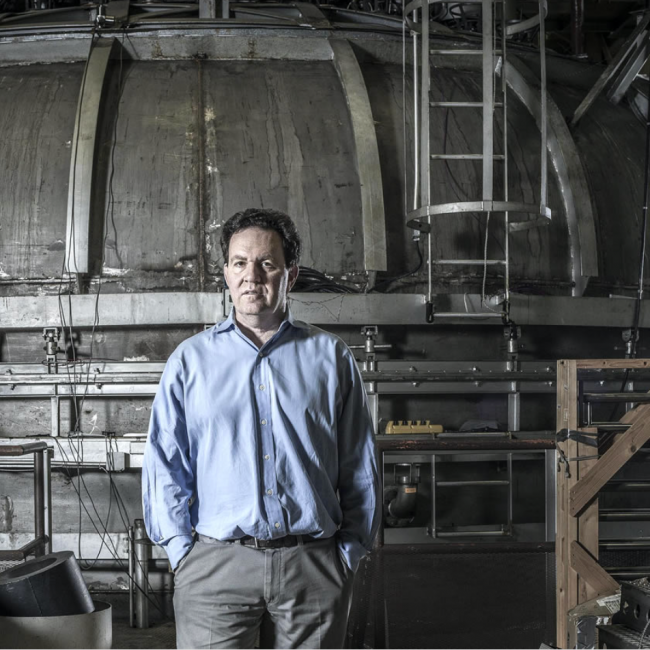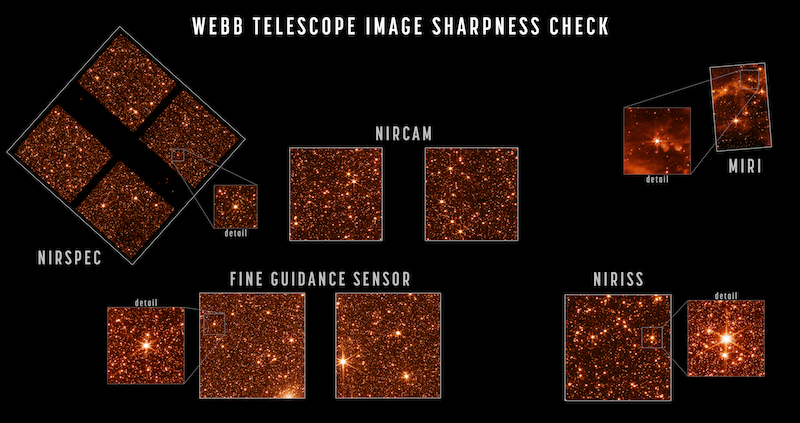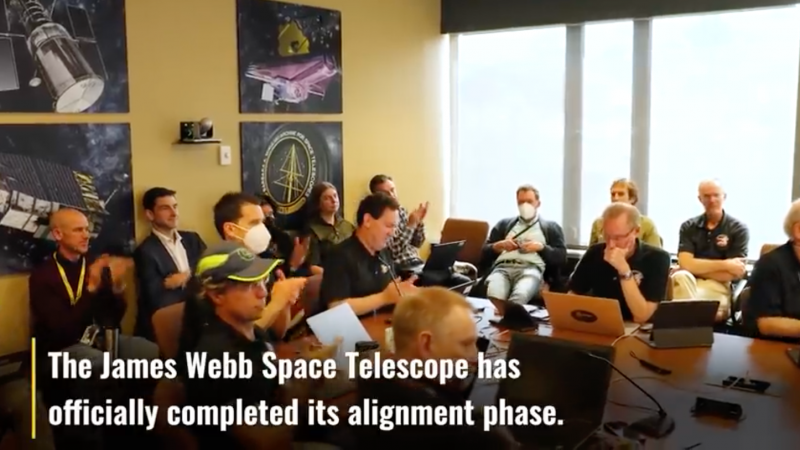The excitement of the James Webb Space Telescope mission continues. NASA announced on April 28, 2022, that the alignment process is now complete. Teams have just completed the seventh and final stage, and all the science instruments are almost ready to start imaging the cosmos this summer. NASA released a new series of test images – called an image sharpness check – to demonstrate the alignment and hint at what future images will be able to show.
If this preview is anything to go by, the first actual science images this summer should be fantastic! The images show a portion of the Large Magellanic Cloud, a small, irregular satellite galaxy of the Milky Way.
Webb is fully aligned – but what does it mean?
What does NASA mean by “fully aligned?” As the tweet below explained on April 28:
‘Fully aligned’ means that Webb’s mirrors are now directing fully focused light collected from space down into each instrument. Each instrument is also successfully capturing images with the light being delivered to them.
First, a quick breakdown. “Fully aligned” means that Webb’s mirrors are now directing fully focused light collected from space down into each instrument. Each instrument is also successfully capturing images with the light being delivered to them.
— NASA Webb Telescope (@NASAWebb) April 28, 2022
The next and final phase of preparations is science instrument commissioning, which will take about another two months. Then, Webb will finally begin its actual science mission, obtaining unprecedented new images and data of stars, galaxies, exoplanets and other objects in the universe.
Webb’s new alignment test images are in full focus
The new test images show that all four of Webb’s science instruments are fully aligned and in focus. It goes without saying that this testing phase is crucial to the success of the mission. As Lee Feinberg, Optical Telescope Element Manager for Webb at NASA’s Goddard Space Flight Center (GSFC), commented:
These remarkable test images from a successfully aligned telescope demonstrate what people across countries and continents can achieve when there is a bold scientific vision to explore the universe.

Even better than expected
The results of the test images, along with the optical performance of Webb overall, are even better than hoped for. All four instruments are capturing images exactly as they are supposed to do. In fact, the image quality is “diffraction-limited,” which means that the fineness of detail that we can see is as good as physically possible for the size of the telescope. Scientists will need to make only very small, periodic adjustments from now on.
Scott Acton, Webb wavefront sensing and control scientist at Ball Aerospace, said:
With the completion of telescope alignment and half a lifetime’s worth of effort, my role on the James Webb Space Telescope mission has come to an end. These images have profoundly changed the way I see the universe. We are surrounded by a symphony of creation; there are galaxies everywhere! It is my hope that everyone in the world can see them.

What’s next for Webb?
Now, Webb enters a new phase, called science instrument commissioning. Basically, this involves making sure that each instrument is ready to conduct the science operations it is designed for. Each instrument is specialized with unique detectors, lenses, masks, filters and other customized equipment. The characteristics of each instrument need to be configured and operated in various combinations to ensure their readiness.
The alignment phase is now over, but there are still some calibration activities to finish. For example, engineers will command the telescope to point to different areas in the sky where the total amount of solar radiation hitting the observatory varies. They do this to confirm the thermal stability of Webb when it is changing targets. Also, to be extra careful, engineers will conduct maintenance observations every two days. This involves monitoring the mirror alignment and, if necessary, applying corrections to keep the mirrors properly aligned.
With this in mind, engineers must do all of the maintenance observations and other testing remotely. Webb is too far away, nearly one million miles (1.6 million km) from Earth, for astronauts to go and service it as with the Hubble Space Telescope. Unlike Hubble, Webb orbits the sun at the second Lagrange point, or L2.
NASA released Webb’s first test image on March 16, 2022. Unlike the new images, it focused on a single star.

Bottom line: NASA’s Webb telescope has finished aligning all of its science instruments. The new test images are fully focused and a taste of what’s to come. The final preparation phase – science instrument commissioning – now begins before actual science operations start in two months.
The post Webb fully aligned! See the new test images first appeared on EarthSky.
0 Commentaires